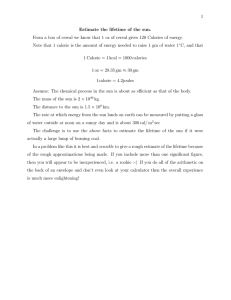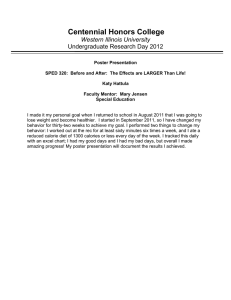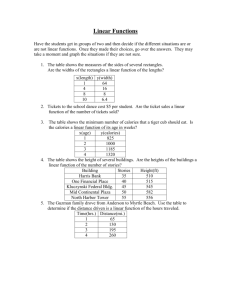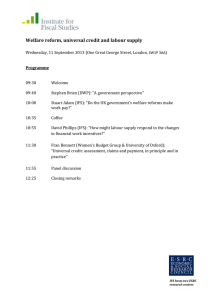Press Release Long term decline in calorie purchases
advertisement
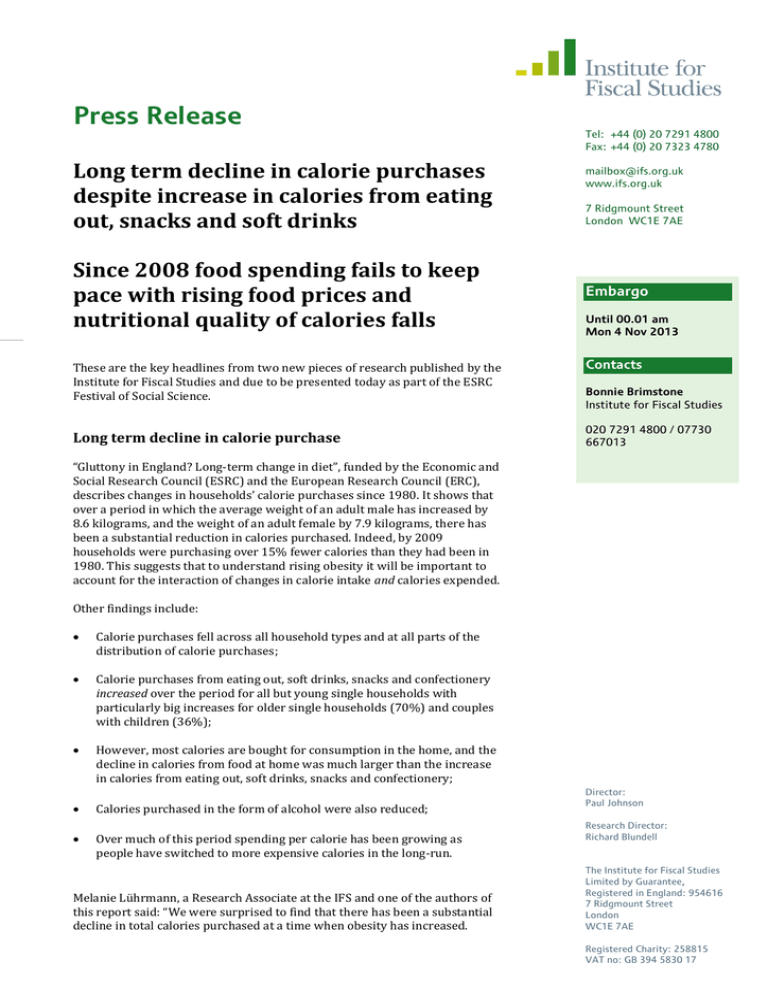
Press Release Tel: +44 (0) 20 7291 4800 Fax: +44 (0) 20 7323 4780 Long term decline in calorie purchases despite increase in calories from eating out, snacks and soft drinks Since 2008 food spending fails to keep pace with rising food prices and nutritional quality of calories falls mailbox@ifs.org.uk www.ifs.org.uk 7 Ridgmount Street London WC1E 7AE Embargo Until 00.01 am Mon 4 Nov 2013 These are the key headlines from two new pieces of research published by the Institute for Fiscal Studies and due to be presented today as part of the ESRC Festival of Social Science. Contacts Long term decline in calorie purchase 020 7291 4800 / 07730 667013 Bonnie Brimstone Institute for Fiscal Studies “Gluttony in England? Long-term change in diet”, funded by the Economic and Social Research Council (ESRC) and the European Research Council (ERC), describes changes in households’ calorie purchases since 1980. It shows that over a period in which the average weight of an adult male has increased by 8.6 kilograms, and the weight of an adult female by 7.9 kilograms, there has been a substantial reduction in calories purchased. Indeed, by 2009 households were purchasing over 15% fewer calories than they had been in 1980. This suggests that to understand rising obesity it will be important to account for the interaction of changes in calorie intake and calories expended. Other findings include: Calorie purchases fell across all household types and at all parts of the distribution of calorie purchases; Calorie purchases from eating out, soft drinks, snacks and confectionery increased over the period for all but young single households with particularly big increases for older single households (70%) and couples with children (36%); However, most calories are bought for consumption in the home, and the decline in calories from food at home was much larger than the increase in calories from eating out, soft drinks, snacks and confectionery; Calories purchased in the form of alcohol were also reduced; Over much of this period spending per calorie has been growing as people have switched to more expensive calories in the long-run. Melanie Lührmann, a Research Associate at the IFS and one of the authors of this report said: “We were surprised to find that there has been a substantial decline in total calories purchased at a time when obesity has increased. Director: Paul Johnson Research Director: Richard Blundell The Institute for Fiscal Studies Limited by Guarantee, Registered in England: 954616 7 Ridgmount Street London WC1E 7AE Registered Charity: 258815 VAT no: GB 394 5830 17 Purchases of snack foods, soft drinks and food out have increased, and now account for a greater share of calories for most households. However, calories purchased for consumption at home have declined strongly and account for the bulk of households’ food purchases. This does not mean that poor diet plays no part in rising obesity. But understanding the interaction between diet and physical activity is clearly crucial.” Decline in spending and nutritional quality since the recession A second report, “Food expenditure and nutritional quality over the Great Recession” also funded by the ESRC and ERC, describes changes in the purchases and nutritional quality of food bought for home consumption since 2005. It uses comprehensive data on food purchases brought into the home by a sample of 15,850 households over the period from 2005 to 2012. It finds that average real food spending fell by 8.5% from 2005-7 to 2010-12, as food spending in cash terms failed to keep pace with rising food prices. From 2007 to 2012 the price of food rose by 10.2% more than the price of all goods (measured by the consumer price index), and the global economic crisis led to falls in disposable incomes. In the face of increasing prices and squeezed budgets, households have both reduced further the number of calories purchased and have substituted towards buying cheaper calories. This reduction in spending per calorie bucks a longer term trend. The report also finds that nutritional quality of food purchased has declined since 2005. For instance, households have substantially reduced the proportion of calories bought as fruit and vegetables, and have switched to foods with more saturated fat and more sugar per 100g. Other findings include: Cut backs in calories and spend per calorie have accelerated following the UK economy emerging from recession at the end of 2009; Couples with young children have reduced their calorie purchases and switched to cheaper calories to a greater extent than other household types; The switch to cheaper calories has coincided with a move to more calorie dense foods, and with a decline in the nutritional quality of households’ food purchases; There has been a substantial shift towards purchases of processed foods and away from fruit and vegetables; Couples with young children, lone parent households and pensioner households have seen the largest declines in the nutritional quality of their purchases. This is partly driven by a much larger switch to processed foods compared with other household types. Kate Smith, a Research Economist at the IFS and one of the authors of this report commented: “Over the recession households have responded to higher food prices and the squeezes on their incomes by switching to cheaper calories. This has coincided with a fall in the nutritional quality of foods purchased, with moves away from fresh fruit and vegetables and towards The Institute for Fiscal Studies Limited by Guarantee, Registered in England: 954616 7 Ridgmount Street London WC1E 7AE processed foods. As a result, the average saturated fat and sugar content of food purchases has increased over this period.” Martin O’Connell, a Senior Research Economist at the IFS and another author of this report said: “Overall this research highlights that links between food purchases and diet related health problems such as obesity are complex. Understanding these links involves considering other aspects of people’s lifestyles and the influence of economic conditions on people’s decisionmaking. This is crucial to assessing the potential impacts of any policy measures designed to improve diet. The broad aim of research in this area being undertaken at the IFS is to shed light on these questions.” ENDS Notes to Editors: 1. For embargoed copies of the report or other queries, contact: Bonnie Brimstone at IFS: 020 7291 4800, bonnie_b@ifs.org.uk; 2. “Gluttony in England? Long-term change in diet”, by Rachel Griffith, Rodrigo Lluberas and Melanie Luhrmann, IFS Briefing Note No. 142, and “Food expenditure and nutritional quality over the Great Recession”, by Rachel Griffith, Martin O’Connell and Kate Smith, IFS Briefing Note No. 143 are published today, Monday 4 November 2013. 3. The work was funded by the European Research Council (ERC) under ERC2009-AdG grant agreement number 249529 and the Economic and Social Research Council (ESRC) under grant number ORA: ES/I012222/1. The European Research Council (ERC) Set up in 2007 by the European Union, the ERC aims to stimulate scientific excellence in Europe by encouraging competition for funding between the very best, creative researchers of any nationality and age based in Europe. Since its launch, the ERC has awarded € 6.3 billion to over 3,800 researchers performing frontier research in Europe. The ERC operates according to an "investigatordriven", or "bottom-up" approach, allowing both early-career and senior scientists to identify new opportunities in all fields of research (Physical Sciences and Engineering, Life Sciences and Social Sciences and Humanities), without predetermined priorities. The ERC, which is currently funded under the EU's Seventh Research Framework Programme (FP7), has a total budget of €7.5 billion from 2007 to 2013. In 2011, the European Commission proposed to almost double the ERC budget under the new EU research programme Horizon 2020 for 2014 to 2020. 4. The results of this research will be presented alongside other work at an event th held as part of the ESRC’s Festival of Social Science at 10am on Monday 4 November 2013: http://www.ifs.org.uk/events/938. The Festival of Social Science is run by the Economic and Social Research Council and takes place from 2-9 November 2013. With events from some of the country's leading social scientists, the Festival celebrates the very best of British social science research and how it influences our social, economic and political lives - both now and in the future. Press releases detailing some of the varied events and a full list of the programme are available at the Festival website: http://www.esrc.ac.uk/news-and-events/events/festival/ . You can now follow updates from the Festival on twitter using #esrcfestival. The ESRC Centre for the Microeconomic Analysis of Public Policy (CPP) is hosted at IFS. The Institute for Fiscal Studies Limited by Guarantee, Registered in England: 954616 7 Ridgmount Street London WC1E 7AE

